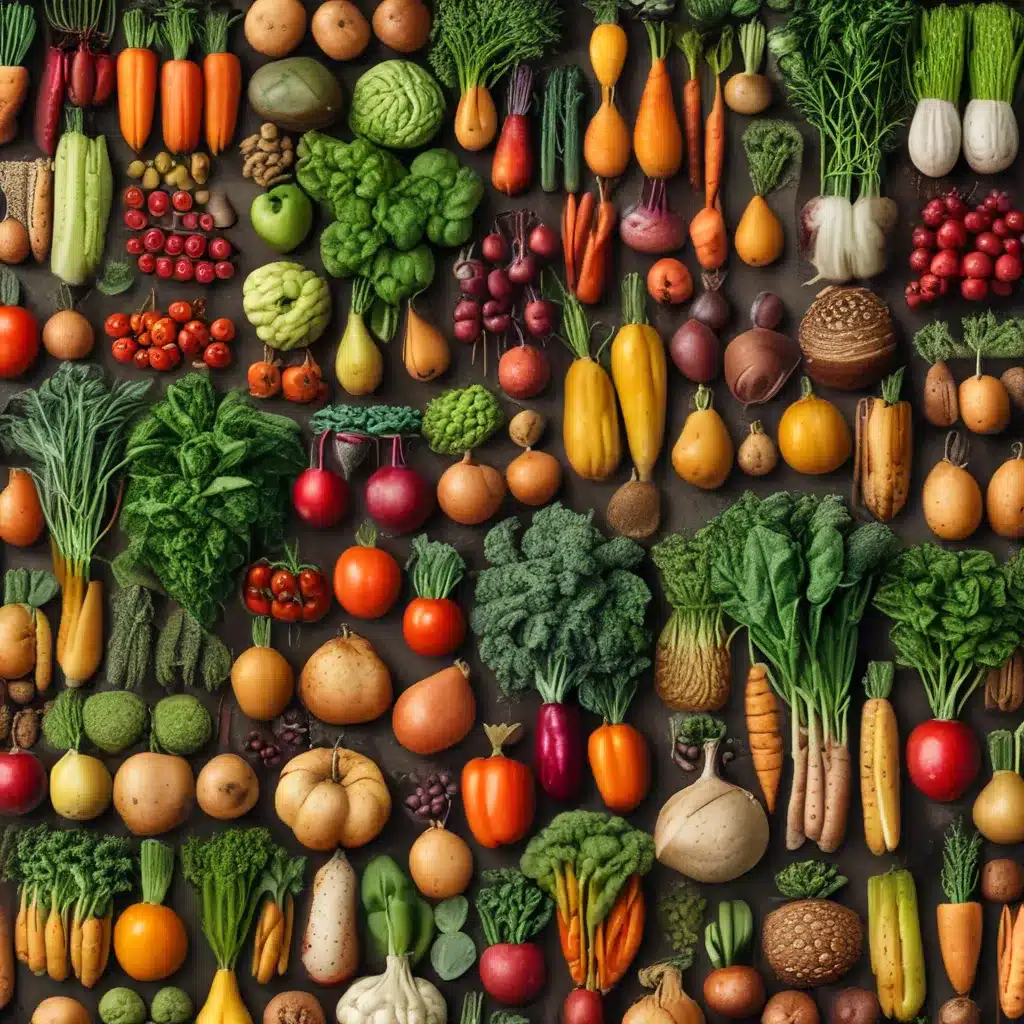
Diving into the Nutrient-Dense Depths of Organic Farming
As I stood amidst the lush, vibrant rows of produce on my local CSA farm, I couldn’t help but feel a sense of awe and appreciation. The verdant greens, the bursting tomatoes, the earthy roots – each item brimming with a palpable vitality that seemed to radiate from the very soil itself. It was in this moment that I truly understood the profound impact of organic farming practices on the nutrient density of the food we consume.
The Soil-Centric Approach: Cultivating Nutrient-Rich Foundations
At the heart of organic optimization lies a fundamental shift in perspective. Rather than viewing the soil as a mere substrate for plant growth, organic farmers recognize it as a living, breathing ecosystem – a veritable wonderland of microbial activity, intricate symbiotic relationships, and a delicate balance of nutrients. By eschewing the synthetic fertilizers and pesticides of conventional farming, they create an environment that allows this natural symphony to thrive.
One of the key pillars of organic optimization is the practice of crop rotation. This strategic planting of diverse crops in succession not only helps to replenish the soil’s nutrient levels, but also disrupts the cycle of pests and diseases. As the Rodale Institute explains, “Different plants have different nutritional needs and are susceptible to different pathogens and pests. If a farmer plants the exact same crop in the same place every year, as is common in conventional farming, she continually draws the same nutrients out of the soil. Pests and diseases happily make themselves a permanent home as their preferred food source is guaranteed.”
By incorporating a wide range of crops, organic farmers can ensure that the soil’s nutrient profile is constantly being refreshed and reinvigorated. This not only leads to healthier, more resilient plants, but also to produce that is brimming with a diverse array of essential vitamins, minerals, and phytonutrients.
Unlocking the Power of Biodiversity
Organic optimization extends far beyond the soil itself, however. By embracing biodiversity, organic farmers create a vibrant, thriving ecosystem that supports a wide range of beneficial organisms, from earthworms and insects to the myriad microbes that dwell beneath the surface.
“Life in the soil thrives on variety,” the Rodale Institute notes, “and beneficial insects and pollinators are attracted to the variety above ground too.” This biodiversity not only helps to maintain the delicate balance of the farm’s natural systems, but also contributes to the overall nutrient density of the produce.
Take, for example, the role of pollinators. By attracting a diverse array of bees, butterflies, and other pollinating creatures, organic farmers ensure that their crops are able to fully realize their potential, producing bountiful yields of nutrient-rich fruits and vegetables. And as these pollinators flit from blossom to blossom, they help to cross-pollinate a wide range of plant species, further enhancing the genetic diversity of the farm.
The Circular Economy of Organic Farming
But the benefits of organic optimization don’t stop there. Organic farmers also embrace the concept of a “circular economy,” where waste is minimized and resources are continually recycled and repurposed. This approach is exemplified in the use of compost, a nutrient-rich soil amendment that is created by breaking down organic matter, such as plant and animal waste.
“Compost is a critical component of organic farming,” explains Infantree, a leading authority on sustainable agriculture. “It not only replenishes the soil’s nutrient levels, but also helps to improve its structure and water-holding capacity. This, in turn, leads to healthier, more resilient plants that are better able to withstand environmental stresses and produce nutrient-dense yields.”
By incorporating compost into their farming practices, organic growers create a closed-loop system where nutrients are continually cycled back into the soil, minimizing waste and maximizing the efficiency of their operations. This not only benefits the environment, but also results in produce that is brimming with a diverse array of essential nutrients.
The Paleo Perspective: Reconnecting with Nature’s Bounty
For those of us who follow a paleo or ancestral-inspired diet, the principles of organic optimization hold a special significance. As The Paleo Mom explains, “Organic produce, grown in healthy, nutrient-rich soil, is more likely to contain the vitamins, minerals, and phytonutrients that our ancestors would have consumed.”
Indeed, the nutrient-dense bounty of organic farms stands in stark contrast to the increasingly industrialized and depleted food system that has become the norm in many parts of the world. By reconnecting with the natural rhythms and processes of the land, organic growers are able to produce fruits and vegetables that are not only visually appealing, but also brimming with the essential nutrients our bodies crave.
The Thornapple CSA Advantage: Bringing Organic Optimization to Your Doorstep
As a member of the Thornapple CSA, I’ve had the privilege of experiencing the transformative power of organic optimization firsthand. Each week, as I unpack my bounty of fresh, vibrant produce, I’m struck by the sheer abundance of nutrients and the depth of flavor that can only be achieved through sustainable, soil-centric farming practices.
From the earthy sweetness of the carrots to the tender, nutrient-packed greens, every item in my CSA share reflects the care and attention that has been poured into its cultivation. It’s a testament to the power of organic optimization, and a reminder that the path to true nourishment lies not in the sterile aisles of the conventional grocery store, but in the rich, living soil of the organic farm.
So, if you’re seeking to unlock the full potential of your produce and experience the transformative power of nutrient-dense food, I encourage you to explore the world of organic optimization and the Thornapple CSA. It’s a journey that not only nourishes the body, but also the soul – a celebration of the incredible abundance that our earth has to offer when we work in harmony with its natural systems.



